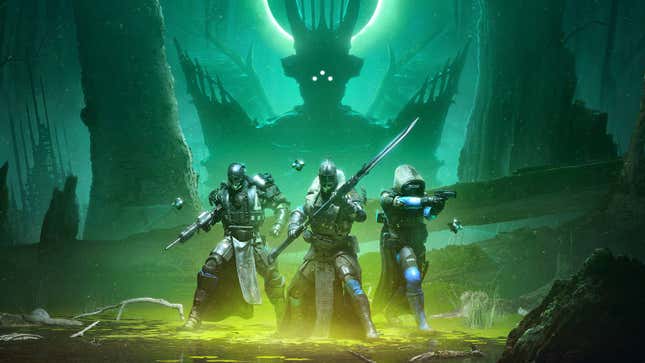
Today, IGN released a massive report on workplace culture, crunch, and hiring practices within Bungie, the development studio behind Destiny and the original Halo series. The report includes dozens of stories from current and former Bungie employees describing a deeply poisonous company culture, and the studio’s slow movement towards something better. For many, though, that progress is not coming nearly fast enough.
A large portion of the report focuses on the game’s narrative team, which has apparently seen employees met with 60 to 100 hour work weeks. That’s in addition to a toxic culture, where managers and team leaders reportedly regularly berate their employees. All the while Bungie claimed, on Twitter, blogs, and interviews alike, to be making significant progress in eliminating crunch throughout its company culture, such as delaying content in an attempt to create better working conditions, and improving conditions for marginalized staff members.
In one particularly telling moment, the report discusses the community’s extremely aggressive response to Destiny 2’s first expansion, The Curse of Osiris. The expansion’s story was brutalized by fans, leading managers to increase pressure on the narrative team. As other portions of the company moved away from crunch, the game’s narrative staff doubled down, desperate to produce something that would satisfy the incredibly high demands of audiences and shareholders alike.
Per IGN’s report and Bungie’s own blog, the studio’s previous strategy for eliminating crunch was to cut features and content which would require too much time to be completed, alongside delays as needed. On face value, this is a good solution. Don’t do things you don’t have the time or resources to do. However, in practice this led to the narrative team hiding its crunching practices to avoid additional feature and content cuts. The fear was that, without those additional features or polish to the narrative, the team might suffer more public and private backlash.
In a blog post responding to the feature, Bungie CEO Pete Parsons lays out a handful of steps the company has taken to mitigate the concerns contained therein. Beyond delays, the CEO claims to have fired bad actors, restructured teams, and has apparently re-evaluated its hiring and promotion processes from the ground up. The post also describes inviting a third party to verify fair employment practices. Parsons goes on to list the company’s diversity statistics across every level of the company, with about 20% of its total staff being women and another 20% falling into other assorted marginalized groups.
Despite CEO Pete Parson’s claim of creating an improved work environment, on the ground change is significantly slower. Bungie is still a profit-driven corporation, and that means doing things as cheaply and quickly as possible. When promotions and advancement are tied to the success of your work in the market, working with a team that ends up being cut to avoid crunch (as many of Bungie’s marginalized members were, per IGN’s report) means languishing in a lower pay bracket with significantly fewer advancement opportunities.
Couple these structural failures with a group of managers who became known for berating employees, encouraging crunch, and consistently delivering racist and sexist remarks, and you have a company culture that actively ruins the lives of its employees. In the report, Bungie employees acknowledged that, compared to other studios, they have a relatively tolerable place to work. However, being relatively better in hell still means you’re in hell. The increased pressure on employees and managers alike demanded by corporate business standards will, almost inevitably, breed a workplace culture that encourages crunch, competition, and demanding bosses. Bungie’s assertion that it has a “we don’t tolerate assholes” policy can only go so far without meaningful structural changes. Still, some current and former employees look to the studio’s future and its ongoing changes with hope.
In his blog post, Bungie CEO Pete Parsons says:
As CEO, it is my job to factor both the past and the future and be accountable for all of it, here and now. Speaking with the team at Bungie, reading the stories, and seeing both known and newly surfaced accounts, it is clear we still have work ahead of us.
I am committed to it. We are not yet the studio we have the potential to become, but we are on our way. And we will not rest or slow these efforts because we recognize that the journey of inclusivity, diversity, and equity is, in itself, the destination we all strive towards. This is critical to achieving our vision and fulfilling the potential of the welcoming, equitable home of creative and technical excellence Bungie should be.
If Parsons truly wants to build a better workplace for his hundreds of employees, then he had better be willing to show up at the bargaining table should the time come.
Bungie is the latest major studio to receive allegations of consistent harassment, sexist and racist workplace practices, and a total lack of significant action to solve these problems. It joins the ranks of Quantic Dream, Ubisoft, and the studio’s own former publisher, Activision Blizzard. Each of these studios and publishers have been at the center of a reckoning in the video games industry, where decades long practices and structures are finally being questioned by the employees who are subject to them.
It is these foundational, structural concerns, in addition to an industry-wide reckoning with bad actors, that pushed the employees of Activision Blizzard towards unionization. I can only hope that their contemporaries at Bungie, Ubisoft, EA, and throughout the “AAA” and independent scenes alike will follow their lead. It’s about damn time.